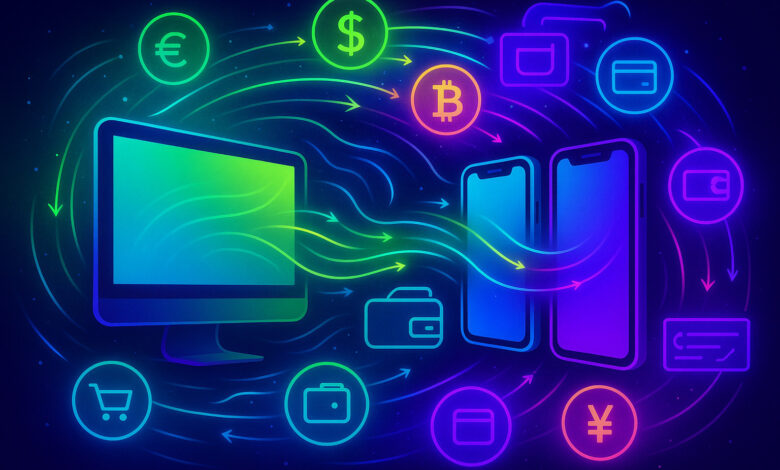
Picture this: a freelancer gets home from work and opens her favorite shopping app. The browsing experience is flawless; it has personalized recommendations, one-click checkout, and instant confirmation. She enjoys the smooth, satisfying digital experience we’ve all grown to expect.
But later that night, she faces the kind of disjointed, unwieldy digital experience we all dread. As she tries to access her freelancing earnings, the login process and interface are confusing. Things get worse from there; she’s offered only a single payout option, can’t tell if there are fees that will dig into her funds, and has no idea how long it will take to actually get her money. She feels dejected.
The disconnect between these two experiences isn’t rare. The payments industry has spent decades perfecting how people pay, but how people receive payment? Still an afterthought. Whether it’s an independent worker, loyalty program member, employee being rewarded, or an individual receiving a disbursement, payout recipients of all kinds have just had to endure whatever clunky, slow process got them their money.
That’s no surprise, since businesses have often treated payouts like a necessary administrative burden. That indifference made sense when payouts were purely mechanical and options were limited: Money arrived in whatever form a business chose, box checked, case closed. But people now expect the same intelligence they get everywhere else.
Imagine that same freelancer could access her money instantly, choosing from a tailored menu of options in a single tap. AI is now helping businesses deliver that.
The following are three ways AI is driving change in the next phase of payouts, which make not only the payout experience faster and smarter for the recipient, but also more powerful for the businesses that offer them.
Data-Driven Payouts: From Reactive to Predictive
Much like the example above demonstrates how ecommerce has improved the user experience, so too has the industry developed a knack for harnessing the power of data. Every click, hover, and abandonment gets analyzed, optimized, and monetized. Payouts, meanwhile, have remained largely ignored.
AI changes this dynamic completely. Every payout becomes a data point in a larger behavioral model. We begin to see patterns that were less visible before: recipients who prefer speed over optimal exchange rates, segments that respond to incentivized redemption experiences, and freelancers that treat payouts as a loyalty signal.
These insights unlock strategic possibilities previously unimaginable. With insights from AI, businesses can now know the most effective payout methods to offer, which incentives to highlight, and what merchants to showcase. Beyond that, AI-powered dashboards give senders the ability to personalize messaging around their payouts instead of using a bland, templated experience. With AI, the payout itself stops being just a transaction and becomes proof you understand your users.
Fraud Detection Gets Predictive
In the payments sector, cybercriminals are using AI in an alarming 42.5% of their phishing and fraud attacks. Armed with AI, these fraudsters are also escalating the volume attacks on businesses, with 87% of payments businesses reporting an increase in attacks in 2024. But AI is also giving businesses a chance to fight back.
Traditional fraud detection operates like a museum security guard—vigilant but reactive, often not detecting thieves until after they’ve already pocketed the artifacts. Machine learning models, on the other hand, don’t just detect breaches; they analyze behavior patterns and predict intentions. They parse behavioral signatures that betray malicious actors before the first cent moves. The system learns from every interaction, building immunity against threats that haven’t even been attempted yet.
Consider the implications: Payouts that were once fraud targets—high-velocity, cross-border, often anonymous—become defensible in real time. Smarter fraud modules reduce false positives, flag edge cases earlier, and ultimately allow funds to move faster without sacrificing safety.
Payouts Orchestration Simplified
Scale typically kills personalization. The more users you serve, the more you default to lowest-common-denominator solutions. AI inverts this relationship. The larger the dataset, the more precise personalization becomes.
A rideshare driver in Mexico City who consistently chooses instant transfers during peak hours but switches to standard ACH on weekends. A content creator in São Paulo who splits payouts between a bank account and cryptocurrency based on pricing fluctuations. A marketplace seller in Detroit who prefers gift cards to their favorite merchants when shopping seasonally and instant debit card transfers otherwise.
These micro-preferences, multiplied across millions of users, are burdensome to manage manually. AI makes them effortless. And while it’s no secret that when it comes to how they receive their money, recipients want more choices, and most would even pay to have more options. But providing too many options can backfire.
AI can help eliminate this friction through intelligent curation. Instead of overwhelming users with every possible payment rail, the system orchestrates a personalized menu.A Universal Payouts system doesn’t just remember preferences—it anticipates them, surfacing the right option at the right moment without any conscious decision-making required.
Turning a Function into a Feature
Most companies still treat payouts as plumbing—essential but invisible; functional but forgettable until something goes wrong. But when AI helps make payouts faster, smarter, and safer, they become something else entirely: a lever that can activate a freelancer’s loyalty to their platform, increase basket size for a gift card recipient, and build brand trust with a shopper who receives a rebate or reward.
When recipients are given a delightful, customized payout experience, payouts can transform from a necessary cost into a competitive advantage. With AI supporting the flexibility, personalization and utility of payouts, businesses turn their most mundane processes into meaningful differentiation.




